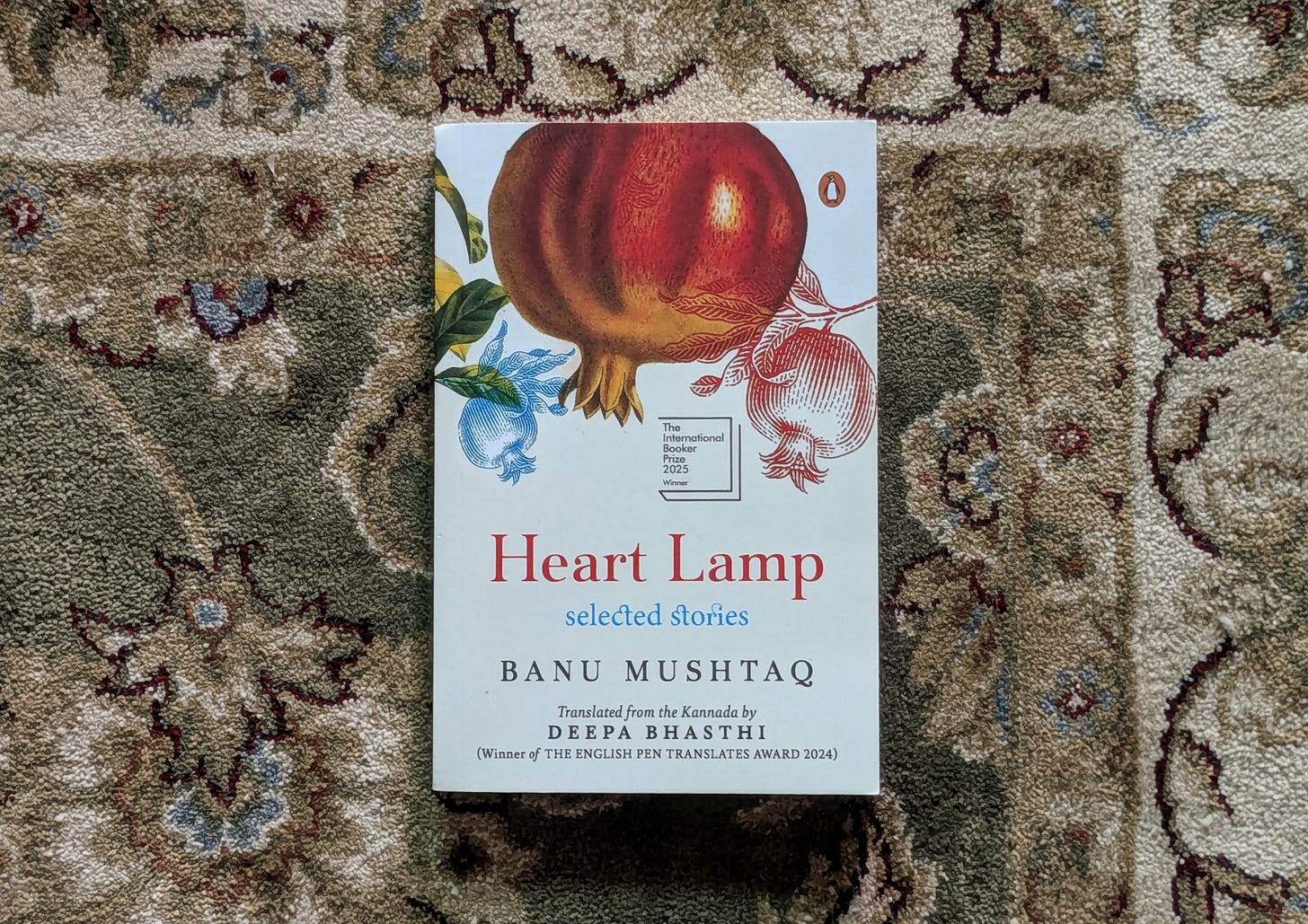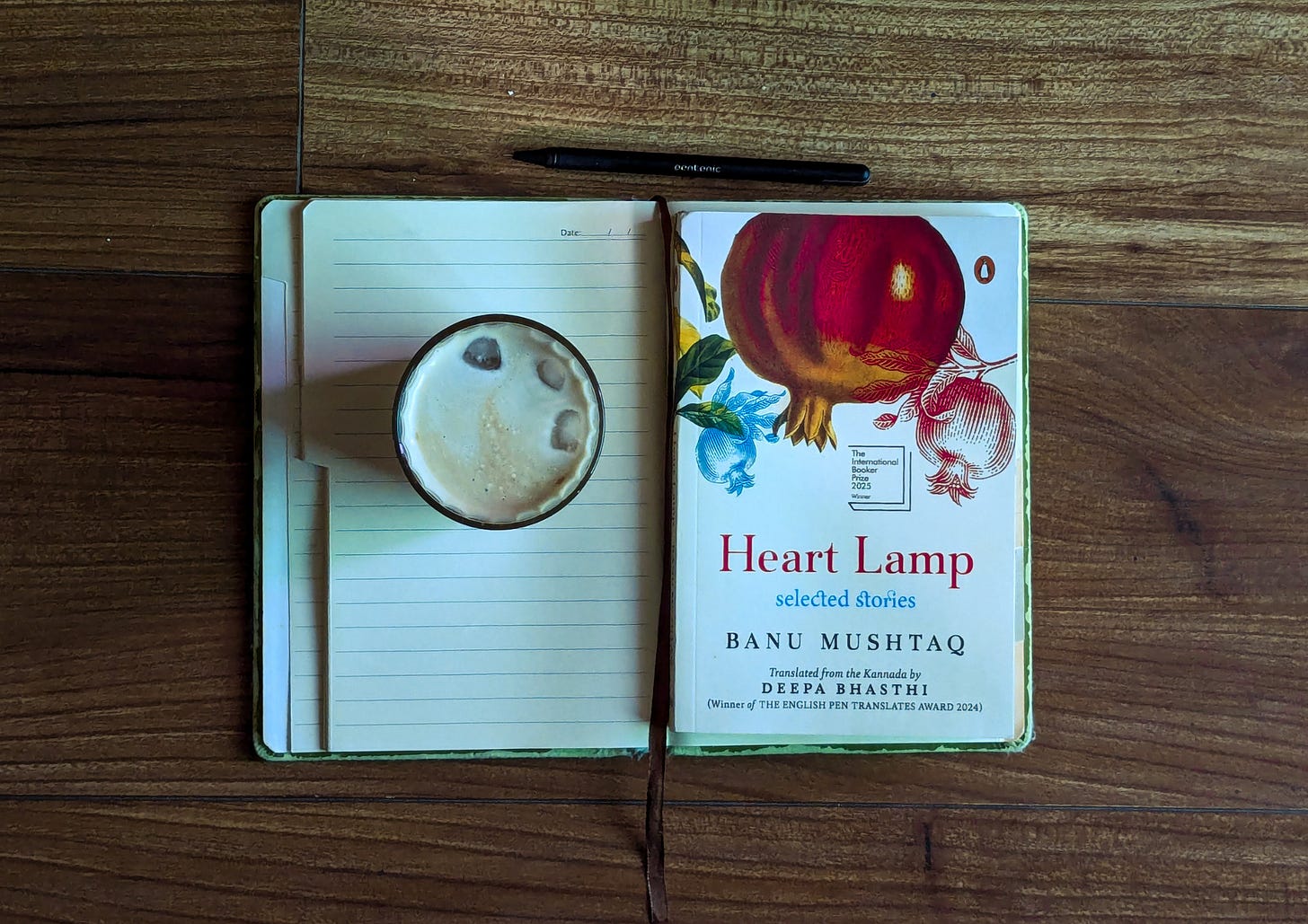when does a woman's heart lamp burn out?
thoughts & more on heart lamp by banu mushtaq
a world lit by women, burned by men.
Patriarchy isn’t just a social order in Heart Lamp it’s the architecture, the furniture, the curtains, and the damp smell that never leaves the walls.
In Banu Mushtaq’s Karnataka villages, women are told to love, but not so much that love eclipses duty; to feel, but not so deeply that feeling interrupts service; to live, but only within the borders drawn by men.
Here, religion props up social rules, domestic arrangements keep women tethered to hearth and womb, and any rebellion is punished with the same enthusiasm as a neighbourhood scandal.
This isn’t quiet oppression either.
The mosque loudspeaker calls the faithful to prayer, but in the small kitchens, under roofs that remember monsoon damp, the real sermons are delivered by husbands who return from work angry, brothers who speak of honour as though it were currency, muttawallis who know the rules only when they serve their own.
The cruelty here is sedimentary. It accumulates in corners, in cupboards, in the folds of a sari that smells faintly of kerosene.
How long can a woman’s heart keep burning like a lamp? Maybe until the oil runs out. Maybe until the wick gives in. Or until someone blows it out, claiming it was for her own good.
meet heart lamp, the 2025 international booker prize winner.
Twelve short stories. Twelve bruises, some faint, some fresh. Women pressed into the damp clay of patriarchy until they hold the shape of someone else’s hands. Mushtaq writes of them the way the winter writes on glass: fog first, then the slow clearing to reveal what you didn’t want to see
Written first in Kannada, they arrive in English through Deepa Bhasthi’s steady, unitalicised hand. The collection has already netted an International Booker Prize and sits proudly within the Bandaya Sahitya tradition, a Kannada literary movement of the 70s and 80s that rebelled against upper-caste, male-dominated narratives.
And while the themes are geographically rooted, the injustices Mushtaq captures could play out in any part of the world that treats women as either servants, baby factories, or both.
Perhaps this is why while it didn’t sit well with the western audience, readers in thrill world/developing countries felt called out, remembered their grandmas stories or anecdotes heart in the whispered gossips of their aunts.
a tour through the streets lined with burning lamps.
There’s a particular kind of heat in Banu Mushtaq’s writing. Not the kind that sits politely on your skin, but the kind that seeps under it, like red dust under fingernails.
In Stone Slabs for Shaista Mahal is a story about love that looks liberal until it isn’t, and the way mon uments (hello, Taj Mahal) can lie about the kind of love they stand for.
If Shaista Mahal made me angry, Fire Rain lit the match. Funerals, hypocrisy, religious zeal, and a man who forgets his family but remembers his sect. Ends with a twist that pulls the rug and leaves you gutted.
Black Cobras takes that anger and twists it into something darker: the whispers of women who have no power left except to murmur. Violence here isn’t a single event . Abuse stacked on abuse, a cycle so old it’s practically architecture.
By A Decision of Heart the cruelty shifts shape. The wife as abuser, the husband as the calm one (in a universe where “calm” simply means “only occasionally violent”). You want to hate her, and you do, but the culture that shaped her still hums under the floorboards.
Red Lungi is almost slapstick at first. Eighteen children in the heat, circumcision as crowd control, until you realise the humour is covering a wound: Razia’s migraines, eighteen noisy children, and a “solution” that says more about class, cruelty, and ritual than it intends.
In Heart Lamp, Mehrun walks straight into the blame machine. Husband cheats? Must be her fault. Seeks help? Dishonours the family. A story about the neat trick society plays: telling women to endure, then condemning them for flinching.
High-Heeled Shoes Starts like a creepy story, veers into sweetness, swerves back to creepy and then surreal. A shoe as a cage, love as possession, family as a marketplace. All ruined by one man’s greed.
Soft Whispers takes you back to an “innocent” kiss at nine years old sounds harmless, until you remember girls here can be married at nine. A mother who seems a monster but is really a child-bride still bleeding from the wound of her own wedding.
A Taste of Heaven is one of the most heartbreaking story in this compilation. It holds in its palm the impossible balance of cruelty and tenderness, where faith and love twist together until you can’t tell them apart, and the smallest objects become vessels for grief too big to name.
The Shroud binds you in a promise broken, guilt like a weight you can’t fold away. A rich woman’s betrayal of a poor one, wrapped up in something as small—and as heavy—as a burial cloth.
The Arabic Teacher and Gobi Manchuri, a story about how appetites — for food, for power — can ferment into cruelty, and how humour, in Mushtaq’s hands, grins right up until it bares its teeth.
The most powerful, poignant and poetic story you’ll read in this book is Be a Woman, Oh Lord. A letter to God from the pit of womanhood’s grief. If You’re going to make a world like this, the narrator says, try being the one You keep breaking.
the translator’s touch.
Deepa Bhasthi’s translation refuses the usual “exoticising” tricks. No italics to mark Kannada or Urdu words as “foreign. No parenthetical definitions. Local phrases sit in the sentences like they belong there (because they do), making the reader inhabit the language instead of touring it. It’s a choice that keeps the world of Heart Lamp intact with no glass wall between character and reader.
my verdict.
Mushtaq’s style is blunt and unflinching — she has a gift for metaphor (“women-shaped lizards” watching from balconies; “the black hen of ignorance” at dawn) and an eye for the small objects that hold whole histories: a prayer mat, a mango tree, a pair of heels.
The patterns of abuse, endurance, a flicker of defiance repear until the reader feels the exhaustion not as a flaw but as the book’s central weather. This is the point: there is no climax, no grand rebellion that burns the house down. Only the steady smoke of kitchens where women live out the same season, year after year.
If a debut novel is a tricky beast, then a short story collection that wins you a Booker is a trickier one: it has to be both a sample platter and a single meal. Heart Lamp succeeds more often than it stumbles, and when it burns, it burns bright. The question is whether the smoke is from the fire Mushtaq lit in her pages, or from the houses still burning in the world outside them.
⭐️ 4.5 stars
with love,
siddaq.




Loved this!